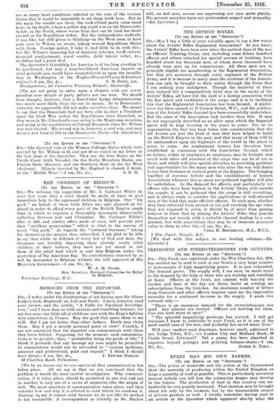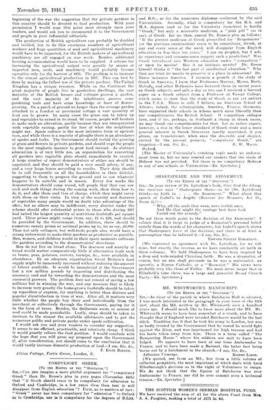EVERY MAN HIS OWN FARMER.
(To THE EDITOR OF THE " Sesoreroa.") Sin,—The prices of foodstuffs and the action of the Government show the necessity of producing within the United Kingdom as large a quantity of food as possible. This is particularly necessary because nobody can tell how the submarine danger may develop in the future. The production of food in this country can un- doubtedly be very greatly increased. That increase may be brought about not only by the farmers, but by the innumerable owners of private gardens as well. I vividly remember having read in an article in the Spectator •whieh appeared shortly after the
beginning of the war the suggestion that the private gardens in this country should be devoted to food production. With your permission I would urge this point most strongly upon your readers, and would ask you to recommend it to the Government and people in your influential editorials.
The production of British agriculture can probably be doubled and trebled, but to do this enormous numbers of agricultural workers and huge quantities of seed and agricultural machinery would have to be imported, for the British makers of agricultural machinery are all engaged on war work. Besides, additional housing accommodation would have to be supplied. A scheme for increasing the agricultural output very greatly by means of imported men, seeds, and machinery would probably become operative only for the harvest of 1918. The problem is to increase to .the utmost agricultural production in 1917. This can best be done by making the fullest use of the private gardens. The United Kingdom has a unique resource. While on the Continent the great majority of people live in gardenless dwellings, the vast majority of the British houses and cottages possess a garden, and the vast majority of the inhabitants possess some gardening tools and have some knowledge at least of flower- growing. On a patch of ground no larger than the average garden attached to a London or provincial cottage a vast quantity of food can be grown. In many cases the grass can be taken up and vegetables be raised in its stead. Of course, people will hesitate to make such an alteration, partly. because they are unacquainted with vegetable raising, partly for fear of what the neighbours might say. Spade culture is the most intensive form of agricul- ture, and while there is a scarcity of ploughs there is an abundance of spades and forks. The Government should forbid the growing of grass and flowers in private gardens, and should urge the people in the most emphatic manner to grow food instead. As abstract admonition is of very little use, an organization for converting all gardens into vegetable plots should immediately be created. A large number of expert demonstrators of either sex should be appointed, and they should be paid a very small salary, if any, and a very large bonus according to results. Their duty should be to call frequently on all the householders in their district, suggesting to them to prepare the ground and to sow whatever happens to be suitable and in season. Every few weeks the demonstrators should come round, tell people that they can sow such and such things during the coming week, show •them how to do it, and offer them seed free of charge, which they might carry with them on their visits. In view of the scarcity and dearness of vegetables many people would no doubt take advantage of the offer; but as others may be indifferent, every district under the scheme should offer substantial prizes to those who during 1917 had raised the largest quantity of nutritious foodstuffs per square yard. These prizes might range from, say, £1 to .220, and should be provided by the Government. In addition, there should be numerous county prizes or national prizes up to, let us say, .21,000. Thus not only cottagers, but well-to-do people also, would have a strong inducement to make their gardens as productive as possible. Men, women, and children would in their spare moments cultivate the gardens according to the demonstrators' directions.
Men do not live on bread alone. The dearness and scarcity of bread would matter comparatively little if alternative foods such as beans, peas, potatoes, carrots, turnips, &c., were available in abundance. By an adequate organization Great Britain's food supply might be immensely increased without reducing the amount of labour available. It would be immaterial if the Government lost a few million pounds by importing and distributing the necessary seed and by rewarding the demonstrators and the most successful growers. The problem does not consist of saving a few millions but in winning the war, and any measure that is likely to increase very greatly the home-grown foodstuffs should be taken up regardless of expense, for anything is better than distress and popular dissatisfaction in time of war. After all, it matters very little whether the people buy their seed individually from the merchant or collectively through the Government, paying for it in the form of taxes. Besides, the deliberate waste or misuse of seed could be made punishable. Lastly, steps should be taken to increase to the utmost the available allotments and to put the numerous public and private parks under spade cultivation.
I would ask you and your readers to consider my suggestion.
It seems to me efficient, practicable, and relatively cheap. I think it would greatly relieve the food position. I would conclude with the hope that you will press my proposal upon the Government if, after consideration, you should come to the conclusion that it would vastly increase domestic production of food.—I am, Sir, &c., Albion Cottage, Fortis Green, London, N. I. Ellis BARKER.



































 Previous page
Previous page